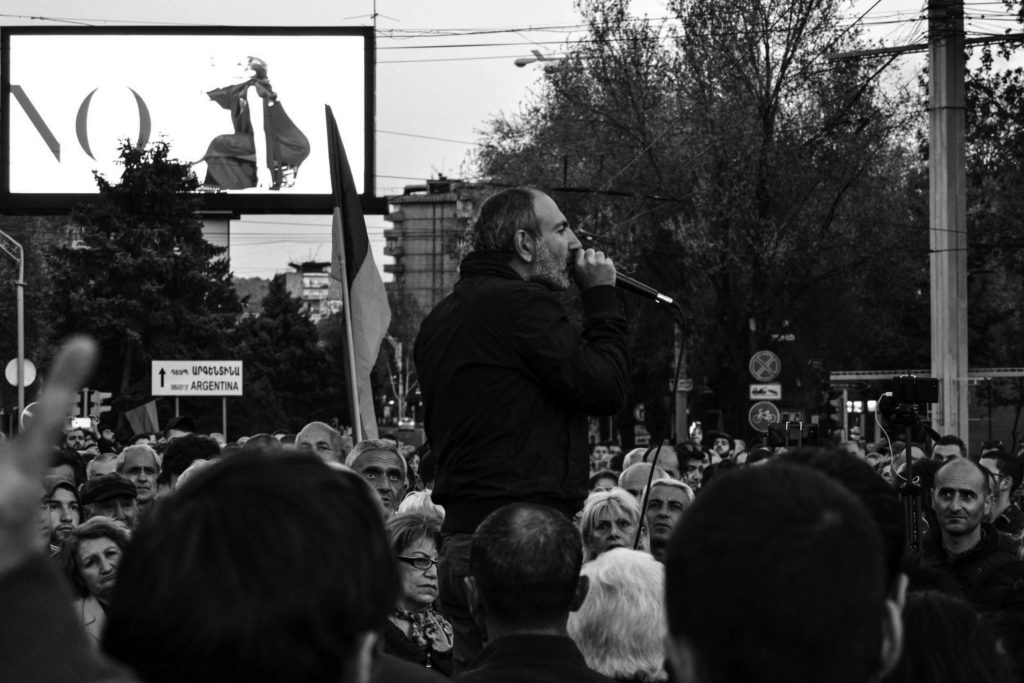
This morning, Nikol Pashinyan was nominated for the role of prime minister (PM) by his party, Yelk (“Way Out”), making him the sole nominee to be voted on tomorrow, May 1, in a special session of parliament.
To briefly recap the events of the last few days leading up to Pashinyan’s nomination, on Friday afternoon, he held a press conference at the Marriott Hotel to begin the “second round of negotiations” with the Republican Party of Armenia (RPA). Acting PM Karen Karapetyan, who released statements that he would not be attending and accused Pashinyan of “dictating his agenda” as opposed to negotiating, did not show up for the meeting.
This made what happened the very next morning all the more unexpected. In what appeared to be a major concession to Pashinyan, the RPA announced in a press conference that it would not be nominating a PM candidate. For context, in his speeches, Pashinyan has stated repeatedly that his goal was not just to secure the resignation of former Republican PM Serge Sarkisian, but also to prevent the entire party from “ruling from the shadows.” At the conference, RPA spokesperson, Edward Sharmazanov, cited “new political realities” as the reason behind his party’s decision.
Shortly thereafter, in seemingly domino-like procession, the remaining parties in Armenia’s parliament released statements expressing allegiance to the “people’s candidate,” i.e. Pashinyan. Gagik Tsarukyan, leader of the Prosperous Armenia Party, gave an interview to Kentron TV amidst a gold-plated backdrop, confirming his endorsement. His faction holds 38 seats in the National Assembly. Shortly after Tsarukyan, the Armenian Revolutionary Federation’s (ARF) Supreme Council representative Arsen Hambardzumyan announced they, too, would be following suit. Combined, the Yelk faction (Pashinyan’s coalition), the ARF, and Tsarukyan’s party control 47 parliament seats, meaning they will need at least 6 votes from the RPA to secure a majority in tomorrow’s PM elections.
As all of this was occurring, Pashinyan spent the weekend making strategic trips to cities outside Armenia’s to engage citizens and garner support. On Friday, he traveled to Gyumri—a significant location not just because it is Armenia’s second largest city, but because it is also where Pashinyan began his movement, called #իմքայլ (#mystep), where he walked for two weeks from Gyumri to Yerevan (March 31 to April 13).
After Gyumri, Pashinyan visited other cities, notably Vanadzor. EVN Report placed estimates of the rally around 10,000. Residents from surrounding towns/villages also joined the protest in Vanadzor.
Today, in preparation for the May 1 vote, Pashinyan spent the afternoon meeting with the heads of all the parties. The RPA also held a special session with Pashinyan (it was open to press as long as they “behaved”), which made it the first interaction between the two forces since the attempted negotiations with then-PM Serge Sarkisian on April 22. During this meeting, members of the RPA questioned Pashinyan on everything from Artsakh (Nagorno-Karabagh) to the Eurasian Economic Union (EEU) and his ambitions as PM. “When I stated the movement I knew I had to carry the responsibility of the outcome,” stated Pashinyan in response to one question asking whether he had his eyes on the PM role from the start, “be it in the form of a conviction or the post of the PM.”
EVN Report provided English translations of many of the Q&A:
Until recently, Pashinyan’s main obstacle in his rise to prominence has been the RPA, which enjoys a 58-seat majority in Armenia’s 105-seat parliament and whose relations to Pashinyan throughout this entire ordeal have been tense. But today, the RPA announced that if the other parties of parliament have gathered behind a single candidate, like Pashinyan, it would not “block,” or “obstruct” their vote. Analysts are not sure if this means the RPA will concede the six votes Pashinyan needs in order to win tomorrow’s election. (For context, if he does not receive the majority vote, according to Armenia’s constitution, in seven days, another round of elections will take place. If again a he does not receive a majority vote, the National Assembly will be dispersed and snap elections must be held, where citizens will elect new members of parliament.)
As he draws closer and closer to the helm of the nation, skeptics have begun raising concerns on a number of points related to Pashinyan’s eligibility for the role of PM. After all, his candidacy for the role was, until just two weeks ago, highly unlikely. This weekend, speculations over his lack of a university degree caused Pashinyan to respond to concerns in a Facebook post.
“In 1991, I was accepted to Yerevan State University, and by 1995, in my fifth year, one or two days before graduating exams, I was dismissed by the university registrar,” he wrote, “The decision had political reasons and was related to my journalism and several articles I had authored. They told me that if I wrote a letter of regret, I could return [to my studies], but naturally, I rejected that offer.”
Local news site CivilNet has reported that Pashinyan was expelled from the university for publishing an article which accused a professor of taking bribes. It is worth noting that academic dishonesty is a widespread phenomenon in higher education institutions across Armenia, and students are often forced into complicity with some form of dishonesty to even receive their degree.
Many have also expressed concern about Pashinyan’s ability to deftly maneuver Armenia’s complicated relations with Azerbaijan and, in the case of an attack, bring the country together defend the homeland. Pashinyan spoke about this at length in an interview with the BBC’s Russian service, highlighting his eagerness to hold dialogue with Azerbaijan, but that doing so is difficult when the country’s belligerent leader continues to make aggressive threats.
“If day in and day out we hear from Azerbaijan that they are planning to go to war with Armenia, that they plan to capture Yerevan–how can we have a constructive dialogue under these circumstances?” he said during the interview. “We are in the 21st century, and we are civilized countries, at least Armenia is. Hopefully you have been able to see that during the last twenty days [of peaceful protests]. But this does not mean that a civilized approach should be interpreted as weakness. Should there be any provocations by Azerbaijan in Nagorno-Karabakh, we will set all internal political issues aside and will focus exclusively on the defense of our homeland,” he added
Additional Reading
Commentary in the Pages of the Weekly:
- Op-Ed: “After April 25: Armenia Toward Revolution,” by Manuk Avedikyan
- Op-Ed: “Armenia is Victorious: Lessons from my Former Student,” by Serouj Aprahamian
Commentary from the Diaspora:
- Armenian Student Associations across the U.S. Pen Letter in Solidarity with Student-Driven Movement in Armenia
- Article: “The Diaspora and What to Do Next,” by Samuel Armen
- Video Interview: “Diaspora and Armenia: Understanding Each Other” between diasporan actress Arsinée Khandjian and CivilNet co-founder Salpi Ghazarian, in CivilNet
- Interview: Richard Giragossian interview, Pt. 1: http://www.1in.am/2343366.html
Commentary from the International Community:
- Op-Ed: “Sometimes Armenian Protests are just Armenian Protests” by Caucasus expert Thomas De Waal, in Foreign Policy



Be the first to comment